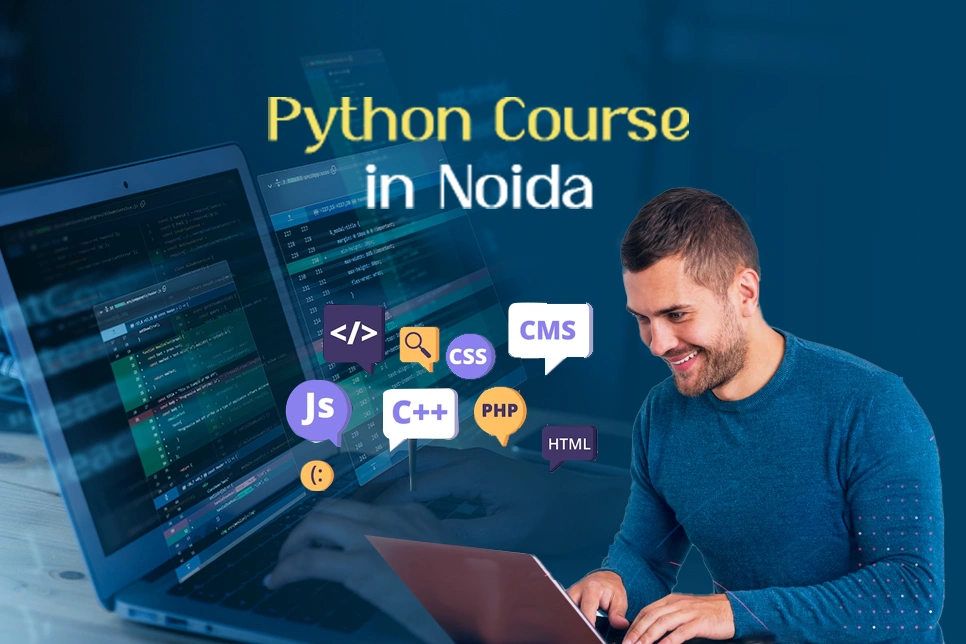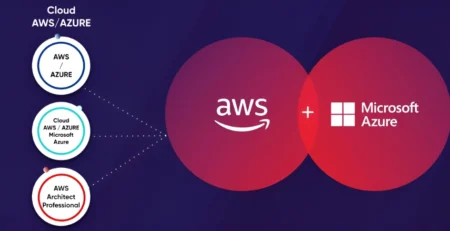Python Course in Noida | From Syllabus Guide to Career Exposure
If you are searching for a suitable programming course to build a career in the IT industry, a Python course in Noida is the best choice, even if you don’t have a technical niche or background. Furthermore, IT project managers, Testing Engineers, Developers, Architects, Mainframe Experts, System Admins, Programmers, experienced professionals, graduates, or post-graduates are shifting to the IT Industry for more career exposure. Furthermore, they are more eager to master Python. However, if someone is too inactive to automate all their daily chores, you must opt for Python courses.
An affordable Python course in Noida begins with the basics of every concept, allowing the expert trainer to start from scratch and progress to the advanced level. Moreover, in this particular way, you do not need to face any kind of confusion when learning Python. Likewise, an IT professional must have a clear concept of their course. Nonetheless, with the Python course offering a 100% placement guarantee in Noida, you receive trained tutors who guide you through the fundamentals of Python. You will learn about terms and functionalities of phrases or words, such as types, values, expressions, variables, and operands.
Additionally, get trained in first-level coding and gain enough practical exposure in the Python world. However, in this comprehensive blog, we will discuss the complete syllabus offered by Rexton IT Solutions, its different yet vital certifications, career exposure, and more.
Career Objective of Python Course in Noida
One of the best parts of learning Python is that you do not need to be a software engineer. Therefore, anyone can learn Python with the appropriate progress in the programming field. All you need to complete your graduation is to start a career in Python and join a Python programming course in Noida to learn the vital Python Skills. Let’s see some primary course objectives that make this course worthwhile.
- The primary purpose of indulging in a Python course with proper certification is to help you master the fundamental skills and learn how to build sustainable code.
- Learn OOPs concepts and how to implement the daily stuff at work.
- With the right Python course, learn to develop real-time applications based on Python and gain knowledge of command-line statements.
- Get the practical knowledge of numerous Python tools and third-party resource libraries, such as Python IDE, CPython, and more.
- Learn containerizing website applications, how to enhance the backend code, and social verification with frontend Python libraries.
- Get the right learning for conveying Python web applications in the most effective ways. Therefore, learn how to plan and integrate with APIs, achieve social verification, and improve your skills for app execution.
- With the best Python classes with certificate in Noida, learn to install Python packages, Matplotlib, Pandas, Web scraping libraries, SciPy, NumPy, Scikit-Learn, etc.
- With the top Python training, anyone can master the theoretical concepts and also become well-versed in the practical use of Python tools and IDEs.
- The noteworthy part is that at Rexton IT Solutions, we prepare our curriculum as per the standards of world-recognized certifications in Python, such as Azure, Microsoft, etc.
End-to-End Python Syllabus Breakdown Offered by Rexton IT Solutions
| Modules | Topic Covered |
| Introduction to Python |
|
| Python Conditional Statements, Loops, and File Handling |
|
| Python: Core Objects and Advanced Data Structures, Functions and Lambdas |
|
| Python: The Object-Oriented Side of it |
|
| Python: Exception Handling |
|
| Python: Debugging |
|
| Python: Regular Expression |
|
| Python: Multithreading Paradigms |
|
| Python: All operations in JSON Files and Windows spreadsheets |
|
| Python: Database Handling |
|
| Python: GUI Programming |
|
| Dealing in REST APIs: The Flask Framework |
|
Unknown Facts About the Python You Should Know Before Opting for It
Python is one of the impressive programming languages that lets you work rapidly and incorporate systems more efficiently. Moreover, here are some intriguing and unknown facts about Python that you must know before planning to opt for a Python course in Noida.
- Python is named after Monty Python’s Flying Circus, not the snake. Yes, you are learning a language inspired by absurd British sketch comedy. Delightful chaos follows.
- Python was designed by Guido Van Rossum as a hobby in December 1989, while he was searching for a new and engaging hobby to keep him occupied during the Christmas week.
- Unlike many languages, Python uses indentation to define code blocks. It’s not just polite formatting. Forget a tab and your code collapses like a poorly stacked Jenga tower.
- Python trades raw performance for readability. If languages were transportation, Python is a comfortable bicycle, not a jet fighter. Beautiful ride, not built for drag racing.
- Tim Peters is a significant contributor to the Python community. He wrote this poem to highlight the Python philosophies. Furthermore, these imperative philosophies can be read by just writing “import this” in the interpreter.
- MicroPython lets Python run on microcontrollers.
- Python doesn’t use braces to delimit code, unlike Java and C++. Likewise, indentation is necessary in Python to keep code organized.
- Google, Netflix, NASA, and Pixar all use Python extensively, leveraging its simplicity, vast libraries, and scalability for a wide array of applications, from data analysis and machine learning to animation and infrastructure management
- Python has been officially dead since 2020, yet it occasionally rattles chains in legacy systems.
- Python joined the AI revolution and arrived wearing a cape and carrying a TensorFlow staff.
Key Building Blocks of Python
Python is one of the successful programming languages. Thus, its success lies in its flexibility, simplicity, and the wide range of library collections and structures it offers. Likewise, comprehending the basics of the Python course in Noida is imperative for anyone who understands the language. Nevertheless, here are the key building blocks that make Python the best programming language.
| Building Block | Description | Example |
| Variables | Containers for storing values | age = 25 |
| Data Types | Kinds of values Python can store | int, float, str, bool, list, dict |
| Operators | Symbols that perform operations | +, -, *, /, ==, >, < |
| Control Flow | Directs the program’s path | if, elif, else, for, while |
| Functions | Reusable blocks of code | def greet(): print(“Hello!”) |
| Modules & Libraries | Prebuilt tools you can import | import math, import os |
| Input/Output | For interacting with users/files | input(), print(), file handling |
| Comments | Notes that help explain code | # This is a comment |
| Exceptions | Handling runtime errors | try… except… |
| Classes & Objects | For object-oriented programming | class Dog: … |
Career Growth After Completing a Python Course in Noida
Let’s see some exceptional career benefits you can relish upon completing the Python course in Noida.
1. Enhance Skills
After completing the course, you can enhance your overall knowledge base and become a skilled programmer in the Python industry. Furthermore, every minute or second you spend learning Python is significant.
2. More Job Choices
When you get over Python classes with certificate, it makes you an above-average student among the crowd. Likewise, your certificate demonstrates that you have hands-on skills and expertise in the Python programming language, and you can excel in your industry sector.
3. Great Salary Exposure
A certified Python programmer typically gets a better salary package than other candidates. Nevertheless, it entirely depends on the affordable Python course in Noida or the company-to-company, on how they identify your skills.
As the best Python training institute, Rexton IT Solutions helps every individual opting for the Python course to grow like a shining star in the IT industry and gain recognition as a certified Python professional.
It’s Time to Wrap Things Up!
We hope this blog has provided you with all the precise details about the Python course in Noida with its comprehensive syllabus guide. However, if you are searching for the best Python programming course, look no further than Rexton IT Solutions. We have a team of professionals who will guide you throughout your course. Moreover, our team of expert, experienced tutors will ensure you learn Python from scratch to an advanced level so that you can grasp the concepts clearly without any confusion.
Additionally, upon completing the course, you will receive a world-recognized certification that will open doors to your IT career. So, what are you waiting for? Enroll with Rexton IT Solutions today!











